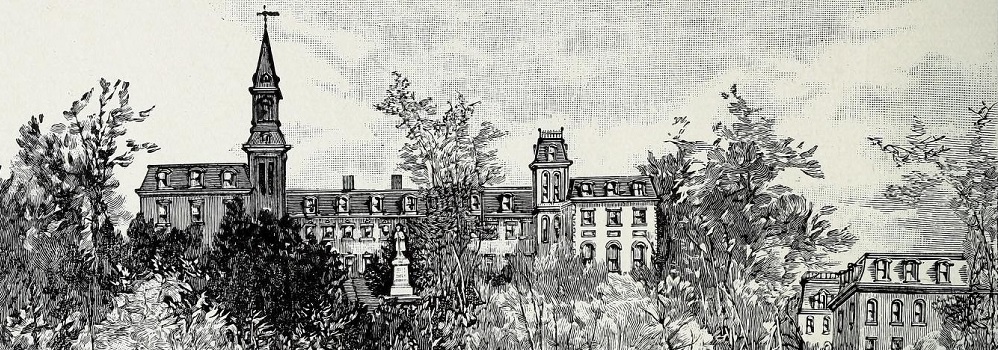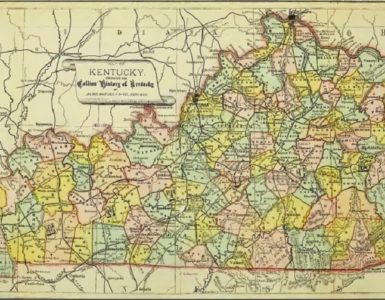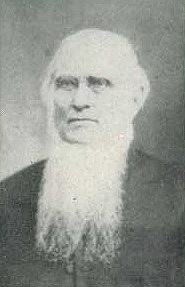 D. X Junkin, David X., was born January 8, 1808, to Joseph and Eleanor Cochran Junkin in Hope Mills near Mercer, Pennsylvania. He had considerable competition around the house because he and his minister brother George Junkin were two of fourteen children. David’s earliest education was provided by Rev. Thomas L. Anderson in his academy near Mercer, but then he continued his college preparatory studies under the direction of Rev. David Kirkpatrick in his school in Milton. Like George, his college work was completed in Canonsburg at Jefferson College in 1831. During his college studies he professed his faith in Christ and became a member of the Presbyterian Church. After teaching in the Pennsylvania Manual Labor Academy in Germantown he entered Princeton Seminary in the winter of 1831-32 where he studied for two-and-half years but did not receive a certificate of graduation (see, “Notes” below regarding failure to complete curriculum and comments regarding the “X” in his name).
D. X Junkin, David X., was born January 8, 1808, to Joseph and Eleanor Cochran Junkin in Hope Mills near Mercer, Pennsylvania. He had considerable competition around the house because he and his minister brother George Junkin were two of fourteen children. David’s earliest education was provided by Rev. Thomas L. Anderson in his academy near Mercer, but then he continued his college preparatory studies under the direction of Rev. David Kirkpatrick in his school in Milton. Like George, his college work was completed in Canonsburg at Jefferson College in 1831. During his college studies he professed his faith in Christ and became a member of the Presbyterian Church. After teaching in the Pennsylvania Manual Labor Academy in Germantown he entered Princeton Seminary in the winter of 1831-32 where he studied for two-and-half years but did not receive a certificate of graduation (see, “Notes” below regarding failure to complete curriculum and comments regarding the “X” in his name).
Ready to enter his ministry, D. X Junkin took the first step towards a call when he was licensed by the Presbytery of Philadelphia on October 17, 1833. After testing his gifts through licensure, he was ordained and installed by the Presbytery of Newton in the church in Greenwich, New Jersey, March 25, 1835. He apparently had met his future wife during his schooling in the academy in Milton with Rev. Kirkpatrick because he returned there to marry Jane McCleery, April 20,1835. Not only did he pastor the Greenwich flock for sixteen years, but he was also Professor of Belles Lettres and Literature in Lafayette College in Easton, 1837-1842. Dr. Junkin’s call was dissolved by the Presbytery of Newton in 1851 so he could accept a new opportunity with the F Street Church in the nation’s capital. After a brief ministry, he returned to Pennsylvania to accept the unanimous call from the congregation of the Hollidaysburg church, which is located about eighty miles west of Harrisburg. He began his ministry in the fall of 1853 and thoroughly enjoyed his ministry to the congregants but suffered considerably from a reoccurring health problem.
Rev. Junkin’s next ministerial service took him from the local church into the United States military. President James Buchanan offered him a commission to serve in the chaplaincy of the United States Navy. He had been suffering from some health problems and hoped the change in location and the sea air would help, so he accepted the opportunity and was stationed first in Philadelphia, then in the Naval Academy ministering to its some two-hundred officers and midshipmen for a year and a half. His last duty was on board the U.S.S. Colorado for just over a year. When the Colorado went to the Gulf of Mexico, his health problems struck again forcing him to resign his position. He had served with the rank of Lieutenant Commander.
One would wonder why he accepted his next call, humanly speaking, given the physical trouble he had in Hollidaysburg and in the Gulf of Mexico, but the same month he left the Navy he was installed pastor of the North Church, Chicago, Illinois. Needless to say, in short order the frigid temperatures combined with the bone-chilling winds from Lake Michigan proved unendurable, and his call was dissolved May 15, 1866 after just about a year of ministry. He returned once again to Pennsylvania but this time he would not leave the Quaker State again. Dr. Junkin was installed pastor of the Presbyterian Church in New Castle on September 13, 1866. While enduring continued pain, he ministered to his flock for thirteen years. Having passed his three score and ten, he felt it was time to retire from active ministry. He was released from his call, July 1, 1879. Dr. D. X Junkin passed away in the home of his daughter and son in law, Rev. F. M. Woods, in Martinsburg, West Virginia, April 22, 1880. His body was returned to New Jersey to be buried in Bloomsbury. He was survived by his wife, Jane, two daughters, and one son.
Pastor Junkin was honored with the Doctor of Divinity by Columbia College in New York sometime after 1845. He was the author of several volumes and for many years was a prolific writer for weekly Christian periodicals. He published a number of discourses, sermons, and books.
The Believer Dead Yet Speaking. A Sermon Preached Sabbath, July 7th 1839, in the First Presbyterian Church, Greenwich, N.J., Occasioned by the Death of the Rev. William B. Sloan, former Pastor of said Church, [1839].
Superiority of the Calvanistic [sic] Faith and the Presbyterian Government: A Discourse Commemorative of the Meeting of the Westminster Assembly, Delivered Upon the Occasion of the
Two-Hundredth Anniversary Thereof, 1844.
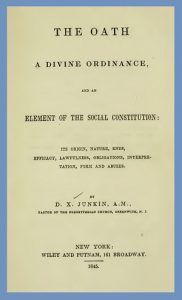 The Oath, A Divine Ordinance, and an Element of the Social Constitution: Its Origin, Nature, Ends, Efficacy, Lawfulness, Obligations, Interpretation, Form and Abuses, 1845.
The Oath, A Divine Ordinance, and an Element of the Social Constitution: Its Origin, Nature, Ends, Efficacy, Lawfulness, Obligations, Interpretation, Form and Abuses, 1845.
The Christian Statesman: A Discourse Occasioned by the death of the Hon. James McDowell, Late Governor of Virginia: Pronounced in the F Street Presbyterian Church, Washington City, Sabbath Morning, September 14, 1851, 1851.
God in Science: An Address before the Philomathean Literary Society of Tuscarora Academy, Academia, Pa., December 28, 1853, 1854.
Study, Its Aims, its Themes, its Results, and its Rewards: A Discourse Delivered before the Philo and Franklin Literary Societies of Jefferson College at the Annual Commencement, Aug. 5th, 1856, 1856.
The House of God the Gate of Heaven, and therefore Dreadfully Solemn: A Sermon Preached at the Dedication of the Presbyterian Church in Bloomsbury, N.J., 1858.
Ebenezer: A Memorial of the Semi-Centenary of the Pastorate of the Rev. James Linn, D.D., Pastor of the Presbyterian Church, Bellefonte, Pennsylvania, Containing a Narrative by Dr. Linn, and a Semi-Centenary Sermon by Rev. D. X. Junkin, D.D., of Hollidaysburg, Pennsylvania, 1859.
The Kingdom of God, its Constitution and Progress: A Discourse before the General Assembly of the Presbyterian Church, by Appointment at their Meeting in Rochester, New York, May 1860, 1860.
The Good Steward; or, Systematic Beneficence an Essential Element of Christianity, 1864.
The Normal Spheres of the Church of God and of Civil Government, with their Relations and Obligations: A Discourse Delivered in the North Presbyterian Church, Chicago, on Thanksgiving Day, November 24th 1864, [1864].
“A Discourse Commemorative of the First Half Century of the Presbytery of Newton,” Proceedings of the Convention at Washington, New Jersey, November 20th, 1867, to Celebrate the Fiftieth Anniversary of the Organization of the Presbytery of Newton, at the Mansfield Church, November 20, 1817, 1868, pages 9-83; also, published separately, History of the Presbytery of Newton, New Jersey, date unknown.
First Presbyterian Church of Hollidaysburg: An Historical Discourse, 1869.
The Reverend George Junkin, D.D., LL.D., A Historical Biography, by D. X. Junkin, 1871;
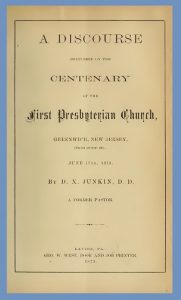 A Discourse Delivered on the Centenary of First Presbyterian Church, Greenwich, New Jersey on its Present Site, June 17th, 1875, 1875.
A Discourse Delivered on the Centenary of First Presbyterian Church, Greenwich, New Jersey on its Present Site, June 17th, 1875, 1875.
“Life and Labors of the Rev. John McMillan, D.D., the Gospel Preached, and its Influence on the Civilization of Western Pennsylvania,” Centenary Memorial of the Planting and Growth of Presbyterianism in Western Pennsylvania and Parts Adjacent; Containing the Historical Discourses Delivered at a Convention of the Synods of Pittsburgh, Erie, Cleveland, and Columbus, held at Pittsburgh, December 7-9, 1875, with Appendices and Illustrations, 1876, pages 9-34.
BARRY WAUGH
Notes—The header is from Men of Lafayette, 1893, and shows a campus scene. Junkin taught there a few years and it is not known to the author if the buildings in the scene existed in his day.
David’s mother’s name is spelled Eleanor, Ellinor, or Elinor, I selected the more common version.
It seems odd that Junkin was so close to completing his seminary program but did not. However, it was too common for students to complete only two years or so and then be ordained in the Presbyterian Church. The faculty of Princeton Seminary complained about the readiness of the presbyteries to except candidates for licensure and ordination that had not completed their studies. For example, the PCUSA General Assembly in 1834 resolved, “That this assembly entirely concur in the opinion expressed in the report of the Board of Directors of the theological seminary at Princeton, that it is highly important that theological students continue the full time of three years in the seminary, and complete the whole course of studies prescribed in the plan” (Minutes, 1834, as in Moore, Digest, 1898, page 556). D. X Junkin may have been one of those students who particularly stimulated the concern at the seminary because he was on campus late in 1831 to 1834 and the Assembly’s action was in 1834.
Sources—primarily the Princeton Seminary Necrological Reports for the year of Junkin’s death, and the article about him on the PCA Historical Center’s blog for April 23, 2015, “This Day in Presbyterian History,” by Director Wayne Sparkman. The image of Junkin is also from the PCA site. Other sources were biographical catalogs for Jefferson College, Lafayette College, and United States Navy Chaplains, 1778-1945, Biographical and Service-Record Stretches of 3,353 Chaplains, Including 2 Who Served in the Continental Navy, Washington, 1948, page 142.


